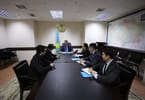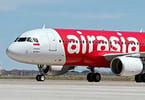Osawa, Japan – A month after Japan’s worst disaster in generations, the snow in the mountains surrounding the resort town of Osawa is melting and the cherry blossoms are bursting.
Diving ducks play in a trout-filled stream near a moss-slicked waterfall, pristine open air hot springs beckon — and not another person in sight.
The tourists that normally flood the area this time of year are nowhere to be seen.
“We’ve never seen anything like this,” says Noriyuki Takada, the manager of the Sansuikan Inn in Osawa. “This whole area will have some real difficulties if the guests don’t come back.”
The empty rooms at the Sansuikan are an indication of the pain being felt by the tourism industry in Japan.
In Iwate Prefecture alone, thousands of guests have canceled trips to Japan’s snow country since the March 11 earthquake and tsunami, says Takada.
Foreign tourists are also steering clear of Japan.
Arrivals this past month were just half the number of the same time last year, according to the Japan National Tourism Organization. And after an initial rush for Japanese to get home and expats to get out, Japan Airlines says that passenger volume is off by at least 25%.
Other airlines, such as Delta, have cut routes or switched to smaller planes to keep seats occupied.
Getting to Osawa is harder since the quake.
The bullet trains to this region haven’t run for weeks and the highway from Tokyo and the south passes right by the Fukushima Daiichi exclusion zone. Until this week, the main regional airport in Sendai was shut down after being flooded by the tsunami.
For now, resorts and hotels like the Sansuikan have shut down entire wings, and trimmed staff and cut hours at their restaurants.
Takada closed the Inn’s fourth floor as the Japanese word for four sounds the same as the word for “death” — an unhappy reminder of the nearly 28,000 people killed or still missing.
But many are considering shutting down for the season, or longer.
Oddly, hotels and inns within about a two hour drive of the tsunami zone are completely booked by aid workers or displaced people fleeing the coast.
Other hotels are discounting rates to disaster victims. One large luxury hotel in Tokyo slated for demolition has allowed hundreds of families to take rooms for up to several months.
One older building of the Sansuikan is full of bustling life and energy with families settled in, making a new temporary community to replace the ones that washed away.
But in the guest wing of the inn it feels more like a quiet Zen monastery than a popular resort.
“Excuse me for the lack of staff to serve you, but please tell your friends and others to honor us with their business,” says our kimono-clad waitress after dinner.
“We need customers now in this terrible time,” she says bowing, “That will help us the most.”
WHAT TO TAKE AWAY FROM THIS ARTICLE:
- A month after Japan’s worst disaster in generations, the snow in the mountains surrounding the resort town of Osawa is melting and the cherry blossoms are bursting.
- The empty rooms at the Sansuikan are an indication of the pain being felt by the tourism industry in Japan.
- But in the guest wing of the inn it feels more like a quiet Zen monastery than a popular resort.






















